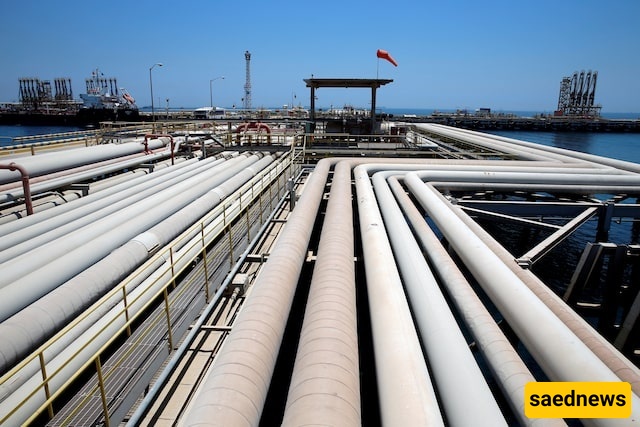SAEDNEWS: Amid signs of instability in the global energy market and mounting political and economic pressures from major consumers, OPEC+ has surprisingly agreed in principle to a significant new increase in oil production.

According to SaedNews, citing Reuters, amid ongoing fluctuations in the global energy market, geopolitical uncertainties, and rising demand following the COVID-19 pandemic, the recent decision by the OPEC+ coalition to further increase oil production has once again drawn the attention of analysts, governments, and market players. Sources close to the negotiations report that OPEC+ members have agreed in principle to a significant rise in daily oil output; however, the exact details and implementation timeline have yet to be officially announced. While the decision appears aimed at stabilizing global supply, it carries multiple economic, political, and geopolitical implications beneath the surface.
The OPEC+ coalition, composed of OPEC member countries along with allies such as Russia, has played a key role in regulating global oil supply in recent years. After the unprecedented crash in oil prices in 2020, the group managed to recover prices significantly through broad production cuts. However, surging demand in the latter half of 2021 and 2022, coupled with supply constraints and crises such as the Ukraine war, led to a sharp rise in oil prices and widespread concerns among consumer nations. The United States, European Union, and China have repeatedly urged OPEC+ to increase production more substantially, yet the coalition’s responses have often been cautious and market-driven. The latest OPEC+ decision marks a meaningful shift in this stance, seemingly driven above all by strategic considerations and multifaceted pressures.
One of the key factors behind this decision is concern over a potential decline in future demand due to an economic slowdown in some industrialized countries. Central banks in Europe and the United States have raised interest rates in recent months to curb inflation—a policy that could slow economic growth and, consequently, reduce energy consumption. Aware of this trend, OPEC+ may have concluded that increasing production at this stage could prevent prices from rising too sharply and thereby avoid a sudden drop in demand later on. In effect, this production boost serves as a form of insurance against more severe future declines.
On the other hand, this decision cannot be analyzed without considering geopolitical factors. Russia, a key OPEC+ member, faces significant challenges in exporting its oil due to Western sanctions. An overall increase in production could provide Russia with more room to maneuver—especially if the increase is structured so that producers not subject to sanctions do not compensate for their share. Additionally, other members, such as Saudi Arabia, are striving to balance their relations with Western countries, particularly the United States. Increasing oil output could be seen as a concession to reduce political pressure or restore Washington’s confidence, although this approach still faces internal challenges within OPEC.
Global markets reacted relatively quickly to the announcement. Brent crude oil prices, which had been trending upward in recent weeks, fell slightly; however, this decline remains limited and fragile. Investors are awaiting more detailed information regarding the scale of the increase and the timeline for its implementation. Financial markets, especially in oil-importing countries, have shown mild optimism. These reactions indicate that markets have long awaited signs of stability and balance in supply, viewing the OPEC+ decision—even at this preliminary level—as a positive signal.
However, this production increase may not satisfy all countries. Some OPEC+ members, such as Nigeria, Venezuela, and Libya, which have lower production capacities, worry that such decisions may favor more powerful countries and disrupt the internal balance of the organization. Additionally, countries investing in renewable energy may view this move as a step toward reinforcing fossil fuels. From this perspective, OPEC+’s action could face political backlash as well as opposition from environmental activists.
Moreover, unless the production increase is matched by a corresponding rise in global refining capacity, it will not necessarily lead to a sustained reduction in gasoline and petroleum product prices. In fact, some analysts argue that the main bottleneck in today’s energy chain is not crude oil production but rather limited refining capacity and weak infrastructure in certain countries. Therefore, while OPEC+’s decision may moderately ease oil prices in the short term, its impact on everyday consumers worldwide will require policy interventions at other stages of the energy supply chain.
Ultimately, OPEC+’s principled decision to increase production reflects more than just a technical market adjustment; it represents a complex balancing act among political interests, economic pressures, and strategic calculations of the coalition’s diverse members. Given global conditions—ranging from economic volatility to geopolitical developments—such decisions can never be analyzed solely within the framework of simple supply and demand. The future of the energy market increasingly depends on multilateral interactions, emerging technologies, and new pathways for sustainable development. While OPEC+’s move may provide temporary market relief, structural challenges facing the global energy system remain.
Whether this production increase marks a step toward long-term balance or merely a short-term remedy for a volatile market is a question whose answer will become clear in the coming weeks and months, through the actions of consumers, governments, and other energy sector players.

